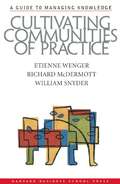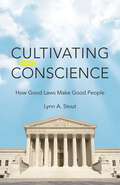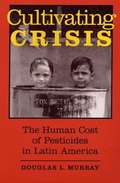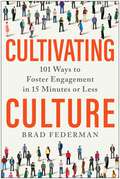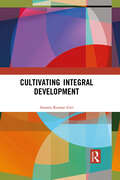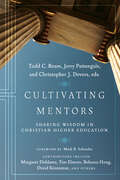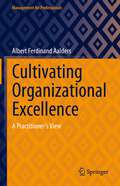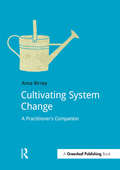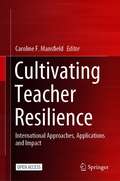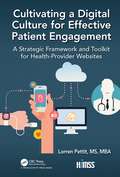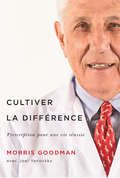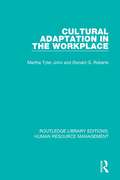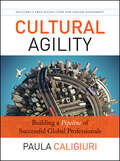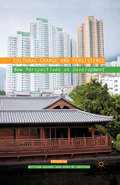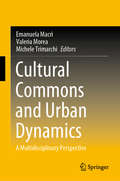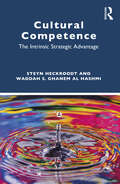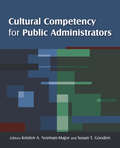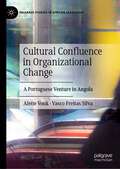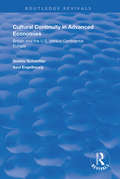- Table View
- List View
Cultivating Communities of Practice: A Guide to Managing Knowledge
by Etienne Wenger Richard A. Mcdermott William SnyderIn order to find out how to make the best use of the knowledge that a company's employees possess, the authoring consultants lift models from Xerox, Daimler Chrysler and the World Bank to show how to tap into the wisdom within.
Cultivating Compliance for Strategic Strength: Mastering the Legal Aspects of Business
by Robert J. Dolan Constance E. BagleyCompliance with the law is just the baseline for winning legally in business. This chapter shows how managers can practice what the author calls "strategic compliance management," which goes beyond mere compliance with the law to embrace organizational integrity and to seek out and exploit business opportunities provided by regulation and deregulation.
Cultivating Conscience: How Good Laws Make Good People
by Lynn StoutHow the science of unselfish behavior can promote law, order, and prosperityContemporary law and public policy often treat human beings as selfish creatures who respond only to punishments and rewards. Yet every day we behave unselfishly—few of us mug the elderly or steal the paper from our neighbor's yard, and many of us go out of our way to help strangers. We nevertheless overlook our own good behavior and fixate on the bad things people do and how we can stop them. In this pathbreaking book, acclaimed law and economics scholar Lynn Stout argues that this focus neglects the crucial role our better impulses could play in society. Rather than lean on the power of greed to shape laws and human behavior, Stout contends that we should rely on the force of conscience.Stout makes the compelling case that conscience is neither a rare nor quirky phenomenon, but a vital force woven into our daily lives. Drawing from social psychology, behavioral economics, and evolutionary biology, Stout demonstrates how social cues—instructions from authorities, ideas about others' selfishness and unselfishness, and beliefs about benefits to others—have a powerful role in triggering unselfish behavior. Stout illustrates how our legal system can use these social cues to craft better laws that encourage more unselfish, ethical behavior in many realms, including politics and business. Stout also shows how our current emphasis on self-interest and incentives may have contributed to the catastrophic political missteps and financial scandals of recent memory by encouraging corrupt and selfish actions, and undermining society's collective moral compass.This book proves that if we care about effective laws and civilized society, the powers of conscience are simply too important for us to ignore.
Cultivating Crisis: The Human Cost of Pesticides in Latin America
by Murray Douglas L.In this study, Douglas Murray draws on ten years of field research to tell the stories of international development strategies, pesticide problems, and agrarian change in Latin America. Interwoven with his considerations of economic and geopolitical dimensions are the human consequences for individual farmers and rural communities.
Cultivating Culture: 101 Ways to Foster Engagement in 15 Minutes or Less
by Brad FedermanAS SEEN IN HR PROFESSIONALS MAGAZINE Perhaps your company culture is immortalized in a mission statement on your website or framed on your office walls, but how often are you actively cultivating those values? Culture cannot be a set-it-and-forget-it aspect of your business. Weaving culture-building into your daily and weekly activities strengthens the engagement of your people and reinforces the key principles of your desired culture, making it a reality. In Cultivating Culture, author, speaker, and leadership coach Brad Federman provides actionable tools for immediately promoting better teamwork, creating two-way conversations with your people, and gaining better feedback about how things are really going. With the belief that we are what we talk about, Federman offers more than 100 ways to engage your team in conversations that matter. Make your meetings about more than tasks, deadlines, and problems, and instead utilize Cultivating Culture&’s pre-meeting notes and activities to grow a deeper understanding of the work you&’re doing and why. Activities are divided into eight key focus areas: Leadership Communication Talent development Inclusion Team harmony Solution seeking Safety Serving your customers Regular attention to these principles will not only sustain your culture and amplify the presence of your values at work, but result in exponential growth in all of your endeavors. Cultivating Culture is your practical, accessible guide to becoming the most effective leader you can, 15 purposeful minutes at a time.
Cultivating Integral Development
by Ananta Kumar GiriThis book cultivates visions and practices of integral development of the self, society, and the world. It builds upon deconstructions of development discourse and practice and strives to reconstruct and reconstitutes it as integral development. It addresses entrenched dualisms in development studies and practices such as between the self and the other, the providers of development and its recipients, materialism, and spirituality, and cultivates pathways of integral development. The book explores the many challenges facing development studies and practice such as poverty, creativity, political economy, moral economy, leadership, sustainable development, and evolutionary flourishing. It also opens the discourse and practice of development to cross-cultural dialogues by undertaking discussions between Euro-centric approaches to development and other visions and practices of development such as Purusartha, Swadhyaya, Sarvodaya, integral yoga, and Lokasasamgraha from Indic traditions. Drawing on multiple cultural and philosophical resources and traditions, Cultivating Integral Development is a pioneering work and will be of great interest to scholars, researchers, and actors of development studies, political science, and philosophy as well as concerned human beings around the world.
Cultivating Mentors: Sharing Wisdom in Christian Higher Education
by Todd C. Ream Jerry Pattengale Christopher J. Devers Christopher J. Devers, Jerry Pattengale, Todd C. ReamMany colleges and universities informally highlight the value of mentoring among academic professionals.Cultivating MentorsDavid KinnamanTim ClydesdaleMargaret DiddamsEdgardo Colón-EmericRebecca C. HongTim ElmoreBeck A. TaylorStacy A. HammonsCultivating Mentors
Cultivating Organizational Excellence: A Practitioner’s View (Management for Professionals)
by Albert Ferdinand AaldersThis book offers a comprehensive approach to organizational excellence based on the author’s vast experience in managing excellence at highly innovative and dynamic organizations. It integrates various approaches into a consistent view of achieving excellence in the context of dynamic technological and societal developments. Starting from purpose and mission, it describes stakeholder mapping and analysis, and process and quality management. In turn, it sheds light on how to deal with business dynamics of various types and demonstrates how quantum-mechanical models can help to understand and manage dynamic organizational processes. The book then introduces readers to result measuring and performance management, followed by organizational learning and rewards and recognition. Moreover, it discusses (innovation) ecosystem leverage and organizational culture management as further important capabilities of excellent organizations. Best practices in corporate social responsibility and environmental, social and governance aspects are fully integrated throughout the book, which concludes by explaining how the UN Sustainable Development Goals can be applied to optimize business initiatives. The book is intended as a source of inspiration for managers working under highly dynamic organizational conditions, helping them take their businesses to higher levels. It also provides valuable industrial insights for scholars with an interest in organizational excellence.
Cultivating Success in the South
by Louis A. Ferleger John D. Metz"This book explores changes in rural households of the Georgia Piedmont through the material culture of farmers as they transitioned from self-sufficiency to market dependence. The period between 1880 and 1910 was a time of dynamic change when Southern farmers struggled to reinvent their lives and livelihoods. Relying on primary documents, including probate inventories, tax lists, state and federal census data, and estate sale results, this study seeks to understand the variables that prompted farm households to assume greater risk in hopes of success as well as those factors that stood in the way of progress. While there are few projects of this type for the late nineteenth century, and fewer still for the New South, the findings challenge the notion of farmers as overly conservative consumers and call into question traditional views of conspicuous consumption as a key indicator of wealth and status"--
Cultivating System Change: A Practitioner’s Companion (Doshorts Ser.)
by Anna BirneyWhere should you start if you are faced with massive systemic challenges or want to cultivate a shift towards sustainability in global systems? Where are the leverage points for systemic change? This book provides examples of what organizations and companies like the Sustainable Shipping Initiative, WWF and Nike are doing, along with practical strategies and an overview of system change theory. Section one outlines systems thinking, especially how we can use a "living systems" perspective as a tool to understanding sustainability and change.Section two pulls out practical strategies for action from theoretical models and "must-read" literature. Section three illustrates how organisations are implementing these strategies – including examples from the Sustainable Shipping Initiative, Nike, Sustainable Food Lab, Finance Innovation Lab, Shell Foundation and Rockefeller Foundation.Section four provides tips for you as a practitioner navigating this territory. Many of the ideas behind cultivating system change can be difficult to understand until they are put into practice. This "practitioner's companion" ends with questions that will prompt reflections and spur you to action. Keep it to hand as you change the system!
Cultivating Teacher Resilience: International Approaches, Applications and Impact
by Caroline F. MansfieldThis open access book follows the development of the Building Resilience in Teacher Education (BRiTE) project across Australia and internationally. Drawing on the success of this project and the related research collaborations that have since emerged, it highlights the importance of cultivating resilience at various stages of teachers’ careers.Divided into three sections, the book includes conceptual, empirical and applied chapters, designed to introduce readers to the field of research, provide empirical evidence and showcase innovative applications. The respective chapters illustrate the ways in which teacher resilience can be enhanced in a variety of contexts, and address specific learning activities, case studies, resources and strategies, student feedback and applied outcomes. They also consider future directions including cross-cultural applications and the use of technologies such as augmented reality. The book will appeal to researchers, teacher educators and teachers, as well as those interested in supporting the cultivation and ongoing development of professional resilience for pre-service and practicing teachers.
Cultivating a Digital Culture for Effective Patient Engagement: A Strategic Framework and Toolkit for Health-Provider Websites (HIMSS Book Series)
by Lorren PettitCultivating a Digital Culture for Effective Patient Engagement offers a strategic framework for healthcare provider websites in order to support patient engagement and connected health initiatives. Referred to as the Health Empowerment Web Strategy Index (HEWSi), the proposed framework is complemented by a detailed "check list" of health empowerment items organizations should incorporate into their website design. A healthcare provider’s website should be an effective resource for empowering the health of patients no matter where patients are in their digital culture evolution. The challenge for many organizations is that patient engagement/connected health initiatives are frequently developed and managed separately from the organization’s digital marketing efforts. This book recognizes this disconnect and advocates for a reimaging of healthcare provider websites based on the four domains of the HEWSi strategic framework: (1) orienting; (2) enlightening; (3) aligning; and (4) personalizing. As a framework and toolkit, HEWSi helps breakdown patient engagement silos within healthcare organizations by allowing varied functional teams (marketing; web developers; patient experience staff; clinical leaders; HIM/HIS personnel; etc.) to congregate around a shared pathway for conversing, strategizing, planning, and developing an effective patient empowerment website.
Cultiver la différence
by Morris Goodman Joel Yanofsky Michel Buttiens Marie-Françoise LalandeWhat goes into making a life successful and what does success mean? If you think about a life as a chemical equation, then the elements are obvious: family, work, purpose. The key is discovering how to get the balance just right. In Cultiver la différence, Montreal entrepreneur and philanthropist Morris Goodman shares his personal and professional prescription for success and enduring happiness. Born in 1931 in Montreal to Ukrainian immigrants during the worst days of the Great Depression, Goodman recounts the events, strategies, and lucky breaks that led to a thriving company and a life of philanthropic accomplishments. From his first job as a pharmacy delivery boy to his graduation from the University of Montreal's Faculty of Pharmacy - when he had already started his own pharmaceutical company - through the crucial moments that created an international business, Goodman depicts stirring accounts of Montreal's Jewish community and the development of the global pharmaceutical industry. Along the way, he presents vivid, generous portraits of colleagues and business collaborators. Cultiver la différence is a powerful rags-to-riches story but it is also much more - it is a heartfelt, candid, and inspiring exploration of what makes our lives rich, what we value, and why.
Cultural Adaptation in the Workplace: Opinion Of The Attorney-general Upon The Title Proposed To Be Given By The New Panama Canal Company To The United States (classic Reprint) (Routledge Library Editions: Human Resource Management)
by Martha Tyler John Donald G. RobertsThe purpose of this book, first published in 1996, is to explore the dimensions of the changing workforce, and examines the issues faced by non-native workers and their employers. This study aims to explore issues such as culture shock and cultural adaptation in the healthcare, fast food and hotel industries in Washington, DC Metropolitan Area. This title will be of interest to students of business studies and sociology.
Cultural Agility: Building a Pipeline of Successful Global Professionals
by Paula CaligiuriHR professionals' guide to creating a culturally agile talent pipeline Succeeding in today's global economy requires organizations to acquire, develop, and retain professionals who can operate effectively around the world, irrespective of country or culture. More than ever before, organizations need a pipeline of professionals who possess cultural agility, the ability to quickly, comfortably, and successfully work in cross-cultural and international environments. As the competition for culturally agile talent grows, meeting this critical human resource challenge requires highly effective, cutting-edge talent management practices. With step-by-step guidance and evidence of effectiveness, this book offers those critical practices—many which can be implemented today. Includes how-to details for implementing talent management practices to build a pipeline of cultural agile professionals in any organization Features illustrative examples from a wide range of organizations, including the Peace Corps, the US Military, and many Fortune 500 companies Allows access to the Cultural Agility Self-Assessment (CASA), an interactive online assessment This book is a must-have resource for human resource professionals and all business leaders who know that the key to their organizations' success in today's complex global economy is their culturally agile human talent.
Cultural Change and Persistence: New Perspectives on Development
by William Ascher John M. HeffronThis book is about the ways that traditional cultural practices either change or persist in the face of social and economic development, whether the latter proceeds primarily from internal or external forces.
Cultural Citizenship: Cosmopolitanism, Consumerism, and Television in a Neoliberal Age
by Toby MillerWhat does it mean to be a "citizen" today, in an age of unbridled consumerism, terrorism, militarism, and multinationalism? In this passionate and dazzling book, Toby Miller dares to answer this question with the depth of thought it deserves. Fast-moving and far-ranging, Cultural Citizenship blends fact, theory, observation, and speculation in a way that continually startles and engages the reader. Although he is unabashedly liberal in his politics, Miller is anything but narrow minded. He looks at media coverage of September 11th and the Iraq invasion as well as "infotainment"—such as Food and Weather channels—to see how U. S. TV is serving its citizens as part of "the global commodity chain. " Repeatedly revealing the crushing grip of the invisible hand of television, Miller shows us what we have given up in our drive to acquire and to "belong. " For far too long, "cultural citizenship" has been a concept invoked without content. With the publication of this book, it has at last been given flesh and substance.
Cultural Commons and Urban Dynamics: A Multidisciplinary Perspective
by Emanuela Macrì Valeria Morea Michele TrimarchiToday, cities are being intensively reshaped by unexpected dynamics. The rise and growth of the digital economy have fundamentally changed the relationship between the urban fabric and its resident community, overcoming the conventional hierarchy based on production priorities. Moreover, contemporary society discovers new labour conditions and ways of satisfying needs and desires by developing new synergies and links. This book examines cultural and urban commons from a multidisciplinary perspective. Economists, architects, urban planners, sociologists, designers, political scientists, and artists explore the impact and implications of cultural commons on urban change. The contributions discuss both cases of successful urban participation and cases of strong social conflict, while also addressing a host of institutional contradictions and dilemmas. The first part of the book examines urban commons in response to institutional constraints from a theoretical point of view. The second and third parts apply the theories to case studies and discuss various practices of sustainable planning and re-appropriation in the urban context. In closing, the fourth part develops a new urban agenda as artists imagine it. This book will appeal to scholars interested in the social, economic and institutional implications of cultural and urban commons, and provide useful insights and tools to help local governments and policymakers manage social, cultural and economic change.
Cultural Competence: The Intrinsic Strategic Advantage
by Waddah S. Ghanem Al Hashmi Steyn HeckroodtTaking a strategic imperative perspective, this book introduces business leaders to a key differentiator that contributes to competitive advantage and financial sustainability: cultural competence. In a fast-changing and globalized world where organizations are being forced to rethink their strategies, understanding present and future environmental, social, and economic challenges is fundamental to creating a resilient and value-creating business. Combining experience and reflection, this book addresses concepts of organizational cultural competence as an internal differentiator and source of competitive advantage. Most organizations approach differentiation as an external feature of product and/or service delivery. Whereas these are open to imitation, cultural competence, as the internal DNA of an organization, is much more difficult, if not impossible, to imitate. The authors bring to bear their years of experience in corporate roles and as entrepreneurs and academics, sharing views and experiences based on research but also on primary examples, meta-insights, and real-world case studies. Senior leaders and consultants across industries, as well as students of strategy and leadership development, will value this serious and comprehensive guide that explains the importance of cultural competence as a strategic advantage in a global market.
Cultural Competency for Public Administrators
by Susan T Gooden Kristen A. Norman-MajorWith a focus on a broad spectrum of topics--race, ethnicity, gender, disability, and sexual orientation at the federal, tribal, state, and local levels--this book equips readers to better understand the complex, real-world challenges public administrators confront in serving an increasingly diverse society.The book's main themes include: What is cultural competency and why is it important? Building culturally competent public agencies; Culturally competent public policy; Building culturally competent public servants; How do agencies assess their cultural competency and what is enough? PA scholars will appreciate the attention given to the role of cultural competency in program accreditation, and to educational approaches to deliver essential instruction on this important topic. Practitioners will value the array of examples that reflect many of the common trade offs public administrators face when trying to deliver comprehensive programs and services within a context of fiscal realities.
Cultural Competency for Public Administrators (4x45)
by Susan T Gooden Kristen A. Norman-MajorWith a focus on a broad spectrum of topics--race, ethnicity, gender, disability, and sexual orientation at the federal, tribal, state, and local levels--this book equips readers to better understand the complex, real-world challenges public administrators confront in serving an increasingly diverse society. The book's main themes include: What is cultural competency and why is it important? Building culturally competent public agencies; Culturally competent public policy; Building culturally competent public servants; How do agencies assess their cultural competency and what is enough? PA scholars will appreciate the attention given to the role of cultural competency in program accreditation, and to educational approaches to deliver essential instruction on this important topic. Practitioners will value the array of examples that reflect many of the common trade offs public administrators face when trying to deliver comprehensive programs and services within a context of fiscal realities.
Cultural Confluence in Organizational Change: A Portuguese Venture in Angola (Palgrave Studies in African Leadership)
by Alette Vonk Vasco Freitas SilvaThis book examines the challenges of intercultural management in sub-Saharan Africa. It presents a case study of Vasco Silva, a Portuguese businessman who established a successful business in Luanda, Angola. After four years of growth, Silva encounters a culture shock due to a wild strike by his employees. He embarks on a deep cultural exploration using the Hofstede 6D model and the Toyota-management tool Genchi Genbutsu (go and see for yourself). Gradually, Silva gains an understanding of effective leadership in the Angolan context, unraveling important features of local culture and initiating an organizational change project. This work contributes to the ongoing discourse in African management literature, particularly regarding the integration of modern and contemporary traditional organizational and leadership concepts. It responds to the demand for descriptive accounts of hybrid case studies of confluencing cultures. Scholars of African management philosophy and business leaders can utilize this case study to explore indigenous African notions in a business setting, demonstrating the performative characteristics of local leadership forms and the adaptability required for success in foreign business environments
Cultural Considerations within Austrian Economics (Elements in Austrian Economics)
by Virgil Storr Arielle JohnIncreasingly, economists realize that a deeper understanding of culture can improve their insights into the most important questions in economics. The Austrian school of political economy, which has always taken economics to be a science of meaning, and therefore, a science of culture, offers a unique approach to the study of culture in economic life. We consider three important differences between these Austrian and non-Austrian approaches: the Austrian focus on culture as meaning rather than culture as norms, beliefs, or attitudes; the Austrian emphasis on culture as an interpretative lens rather than as a tool or form of capital; and the Austrian insistence that cultural analysis be a qualitative exercise rather than a quantitative one. We also examine Geertz's description of culture, Gadamer's approach to hermeneutics, and Weber's interpretative sociology, demonstrating their connections to the Austrian approach and offering examples of what Austrian cultural economics can look like.
Cultural Continuity in Advanced Economies: Britain and the U.S. Versus Continental Europe (Routledge Revivals)
by Gustav SchachterOriginally published in 2005. In the past three centuries Britain, Continental Europe and the United States have all experienced remarkable continuity in terms of the character and nature of the relations between the State and the economy. In a fascinating and eminently readable account, this book examines the significance of ideology in the formation of economic policy in the two groups of countries, comparing and contrasting the minimalist state-ownership societies of Britain and the United States with the interventionist states of Continental Europe. The book uncovers a continued contrast between the economic and social individualism of Britain and the United States, and the reliance on the State typical of nations in Continental Europe. The readership will benefit from a clearer understanding of the varying degrees of intervention in both the domestic and international economic policies employed, and the illuminating comparisons between the Continentals and the more market orientated nations of Britain and the United States.
